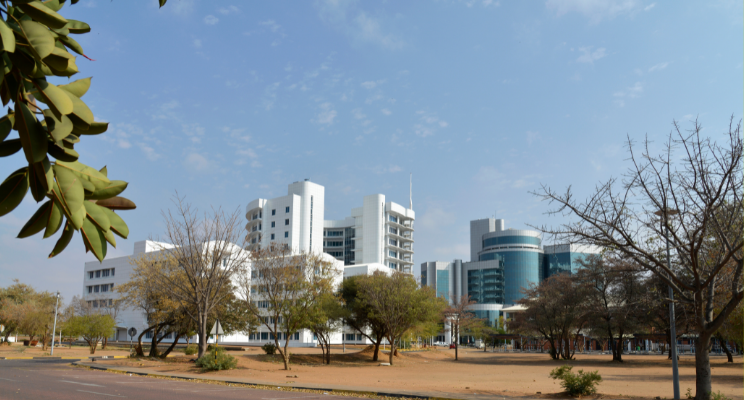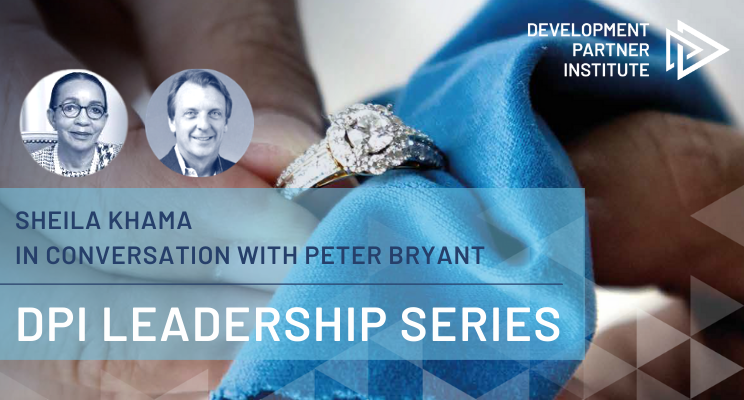Sheila Khama is an extraordinary voice in mining. In September 2020, the renowned mining executive, former CEO of De Beers Botswana, and DPI Board Member sat down with DPI Board Chair Peter Bryant for a conversation. Their exchange touched on issues including building trust between mining companies and the communities they wish to operate in; how asymmetries in understanding the mining process can lead to misunderstandings; and what steps we need to take to make responsible sourcing truly sustainable and effective.
Over the next few weeks, we’ll be publishing a three-part series on this rich conversation and engaging dialogue which captures the depth of Sheila’s experience and perspectives. Here is the first installment:
___________________________________________________________
PB: Sheila, we’re really excited to have you with us today and we’re going to to jump into some areas of high interest and controversy. As we know there’s been various incidents, probably in the last few years from tailing dam failures to the cave incident that’s playing out in Australia, that have all gone on to erode the Triangle of Trust between communities, countries and mining companies. That’s further amplified by, as we know, the Edelman Trust Index, which shows that corporations have a very low trust level and mining companies are at the bottom of that. Can I ask your thoughts? What do you think we should be doing to restore and nurture and rebuild that trust?
SK: I think in a way, you’ve already put your foot on the issue. The Edelman barometer is a good place to start, and I think when we think about the presence or absence of trust in the mining industry, we must see it in the context of what’s happening around the world. And so, the erosion of trust in corporations, in governments, and now in media, is really the single most difficult thing to deal with at the moment.
The question is, if we understand that, how can we position mining so that it progressively restores trust? The way I see it, is that it’s multiple ways: first of all, I think it’s important for those in the mining industry to bring the communities inside of their business to try and reduce the knowledge asymmetry, so that there’s a better understanding of how the industry works. When I speak with people who have not been in the industry, what strikes me more than the absence of trust is the absence of knowledge; the absence of understanding how decisions are made, and how the industry is structured; and how certain things are not a function of one corporation making a decision alone. So, that’s the first thing.
"I think the executives of mining companies have a role to play in really speaking truth to power."
The second thing, I think, to the extent that mining companies do business with countries: I think the executives of mining companies have a role to play in really speaking truth to power, in the political sense. I sense that multinationals do not sufficiently exercise their rights as corporate citizens to engage politicians and use the influence they have to bring reasonableness to bear. I think there’s an unwarranted sense of timidity, and certainly when I worked for both Anglo American and De Beers, I felt that it was my moral responsibility to articulate emphatically, but all the while respectfully, the views I held. And that was important that governments we did business with understood those views. So, I think this is an important thing in building trust.
PB: Sheila, one of the things you’re really talking about there is language as well. In several of the sessions we’ve been facilitating recently with communities and investors in the Rockefeller Foundation Programme, we’ve noticed that indigenous people and communities have all said the same thing: when they speak, they speak in human terms. And we notice that mining companies and everybody else speaks in technocratic language, and they just miss each other. So, we have a mismatch. How do you bridge that? Is there an easy solution?
SK: No, there are no easy solutions, which is, I guess why we are discussing them over and over again. I want to pick on the notion of language. Speaking is not the same as communicating. And so, what I think, is that there has to be a clear understanding of how to communicate, not how to speak. And communication is about being sympathetic to another person’s views. It’s about putting yourself in another person’s views; being sufficiently sympathetic to feel their pain.
"The old traditional structure, where the people with authority, the people with decision-making power live 12 flying hours away from the people they impact, is probably flawed."
And I think one of the errors that corporates make is they fly in and fly out of the community. I think to really understand people’s needs, to really understand their concerns, to really appreciate what matters to them, you have to embed yourself in their way of life. And that suggests that the old traditional structure, where the people with authority, where the people with decision-making power live 12 flying hours away from the people they impact, is probably flawed, and that we need to flip that and create a more intimate relationship with the communities in which the mining takes place. And I think if we don’t do that the chances of continuous misunderstanding, lack of appreciation, lack of empathy is likely to continue.
PB: The two notions of truth to power and creating a more intimate relationship are really, really powerful notions. You’re a native of Botswana, you’ve worked there. Botswana, with De Beers, is held out as a good example of what can be done with resource development to have a positive impact on a country. Can you elaborate? Are there insights and lessons that we can all take from the Botswana story?
SK: I’m often asked this, and I’m always timid, for two reasons: I don’t have the wisdom of the world, and I’m not sure I can advise the world on how to solve mining’s problems. So, let’s just say the audience does well to take my words with a pinch of salt. But be that as it may, the facts speak for themselves.
Mining dominates everything in Botswana. The relationship between the government of Botswana and De Beers is at the heart of that. And research shows us that joint ventures of any type barely last beyond 30 years. The joint venture with Botswana has passed the 50-year mark. So, if only on account of that, not because of how I feel, we can say that there is some level of success.
My sense is that if I were to think of one word it would be ‘pragmatism’. The acceptance that, 1) there are differences; 2) those differences diminish relative to the importance of the relationship; 3) there has to be genuine recognition of the value that each party derives. In my observation, this is the balance that De Beers and the Botswana government strikes. And I think with that has been a certain level of acceptance that in the face of differences, the relationship and its survival rank superior.
So, let me give you a simplistic example:
I think it was 2004, and De Beers and Botswana were negotiating the renewal of the world’s richest diamond mine, Jwaneng. And in 2004, the parties signed a Heads of Agreement. It wasn’t until after three years that all the negotiations were completed, and we were able to sign. And in that period, there was no mining license, there was no marketing agreement, but the parties knew that there was enough trust that they would continue to operate as an entity. And it is this acceptance that one dare not walk away, which I think makes that relationship unique. I don’t know of any place in the world where you run a mine and market diamonds for three years, without having a signed-off agreement - other than the word of both parties - that they will cross that gateway. So, I think this is something that most people will recognise as unusual.

Gaberone, Botswana
PB: You gave a good example of the things you mentioned before: respect, understanding each other and each other’s values. The lament right now is that we’re living in an age where there’s less and less of that; less acceptance of other points of view and the value other people bring, so there’s some heavy lifting to be done. What about transparency? There’s a lot of talk around the incidents that I mentioned…the dam incident, the cave incident…they’ve kind of highlighted a lack of transparency, so what role does transparency have? Are corporates doing enough, and is just abiding by a law sufficient in terms of trying to build trust?
SK: I don’t think transparency is a panacea. But I do think that it is very important. I think it is when you combine transparency with disclosure, meaningfully. It’s not enough to throw a lot of data on the table at people who are not in a position to interrogate it and understand it and contextualise it so that they’re empowered to make decisions.
"So, I qualify transparency with the importance of not providing data but providing useful information that speaks to the interests of those to whom we are disclosing."
I think there’s a fundamental difference, because only then are they able to come back to us and say, “Based on what I know, this is my position.” And with that you migrate from a position of an underdog, to one with a position of advantage. So, I think it’s important to make that distinction.
Having said that, I also think we often make a mistake when we speak about mining, and we speak about companies. I think it’s important not to forget that fundamentally we are talking about people, individuals, making decisions on a day-to-day basis. One of the most important things, especially when it comes to accidents, that ought to be looked at is the culture of the corporation, and the actions we take against those whose decisions lead to these accidents. These accidents don’t happen in isolation of a person being in a position of authority, being in a position of responsibility, failing to act responsibly. And the ability of companies to transparently acknowledge that, the ability of companies to transparently put measures in place that address those issues, in the context of human life and avoiding accidents and human suffering, I think that’s more important than buying into the concept of transparency. Because many of the large companies are listed and listed requirements are onerous – disclosure is already there.
The question is, how many of the issues being disclosed speak to the challenges you and I face – the challenges of trust, the challenges of avoiding accidents, the challenges of fair sharing, the challenges of rooting out corruption both on the corporate and on the political side. That, I think, is the bar we must still cross.
PB: I think that one of the things that companies have to show – their leadership has to show – is a certain vulnerability, like in any human relationship. We have to be vulnerable to create trust, and that’s kind of the antithesis of corporations – vulnerability doesn’t come easy. So, I think that’s a capability to be learned. You need that for disclosure.
___________________________________________________________
You can watch the full conversation between Sheila Khama and Peter Bryant on the DPI YouTube channel. And stay tuned for Part Two of the conversation coming soon.

